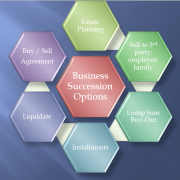Utilizing “QTIP” Trusts for Families in Second Marriages
Estate planning in second marriages can be especially complicated when trying to secure the well-being of loved ones from a previous marriage. Much of the complexity arises from rights granted to a surviving spouse. In Ohio, spouses (male or female) are entitled to dower and elective share rights that often create tension between children from a prior marriage and your second marriage partner.
However, most of these uncomfortable tensions can be avoided through careful estate planning, which often includes a QTIP (or, Qualified Terminable Interest Property Trust). Such an arrangement is especially effective in providing for children from a previous marriage.
Consider the following example:
Let’s say Michael dies while married to his second wife, Kathy. Michael loved Kathy, but out of concern that she might not take the well-being of his children from a previous marriage into account, he established a will that left most of his estate (worth about $12 million including a marital home) to his children. He did, however, bequeath his $100,000.00 IRA entirely to Kathy.
And here is where things become complicated…
Unfortunately, Kathy then dies a week later intestate (without a will), so Michael’s hard-won IRA is automatically transferred to Kathy’s closest relative – her idiot brother, Frank. Because Kathy was entitled to the marital home through Ohio’s spousal rights, the marital home also transfers to Frank. The kids end up with hardly anything. Had Michael properly planned, he could have protected his children’s inheritance, provided income for his wife, and saved considerably on taxes.
QTIP Trusts
In the example above, Michael could have provided for both his children and Kathy had he created a QTIP trust or proper will. Qualified Terminable Interest Property Trusts are commonly referred to as a “Family Trust”, or “Marital Trust.” A QTIP Trust subdivides into (A) marital and (B) family Trusts: the B Trust preserves the children’s interest by restricting the spouse’s access. The remaining spouse receives income and a life estate that satisfies Ohio’s spousal rights. After the second spouse dies, the children receive the remaining assets in the B Trust.
Consider another version of the above example:
Instead of ignoring Ohio’s marital election, Michael plans ahead and created a revocable living trust with a QTIP election. Upon Michael’s death, his trust is sub-divided into an “A” and a “B” trust. Here, $5.43 million of his estate is diverted to his B trust. Kathy is the beneficiary of this B trust, with limited access and receives income from the trust. Because this trust is under the federal estate tax limit, Kathy’s estate tax is $0.00. Over the next 20 years, because of robust growth, the “B” trust is now $17 million. Upon Kathy’s death, trust “B” passes to the Michael’s sons entirely estate tax free.
The remaining $6.57 million in assets are diverted to the “A” trust. Kathy again has restricted access, but can use these funds for her health, maintenance and support. When Kathy has expenses, she uses the “A” trust and saves the “B” trust only for dire necessities. Upon her death, the “A” trust has been reduced (or eliminated) and the tax is minimal, if there is any at all. The remaining balance of the “A” trust passes to Michael’s sons.
QTIP trusts are very popular for people in second marriages. As you can see, the trust provides income for the remaining spouse, yet it preserves your children’s assets.
Prenuptial Agreements
A QTIP trust may not fit under certain circumstances. In cases where there is a disproportionate estate among spouses, a prenuptial agreement may be considered. Certain statutory rights of a decedent’s surviving spouse may be waived by a valid prenuptial agreement. In other words, people may contract for anything in life. This includes signing away your inheritance.
It’s important to remember that a prenuptial agreement may often bring tension among couples. Also, although Ohio recognizes prenuptial agreements to be valid, the state also does not allow you disinherit your spouse. In that regard, oftentimes antenuptial agreements are coupled with estate plans to provide some form of financial security for the surviving spouse.
Prenuptial agreements are valid and enforceable (1) if they have been entered into freely without fraud, duress, coercion, or overreaching; (2) if there was full disclosure, or full knowledge and understanding of the nature, value and extent of the prospective spouse’s property; and (3) if the terms do not promote or encourage divorce or profiteering by divorce.
Prenuptial agreement agreements are a great tool when coupled with a QTIP trust. When combined together, the surviving spouse is provided income and preserved an estate for his or her lifetime. In addition, the children’s inheritance is given extra protection in case of divorce.
Summary
QTIP trusts and prenuptial agreements are two of many ways to provide security for your spouse and children. Through proper estate planning, you can provide a steady stream of income for your spouse and preserve your children’s inheritance. It’s important to consider all options when preparing your estate plan. For more information and or questions, contact attorney Dan Baron at Baron Law LLC – 216-573-3723.








